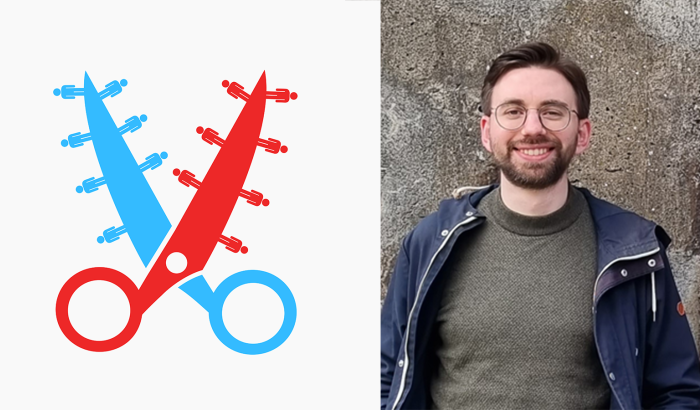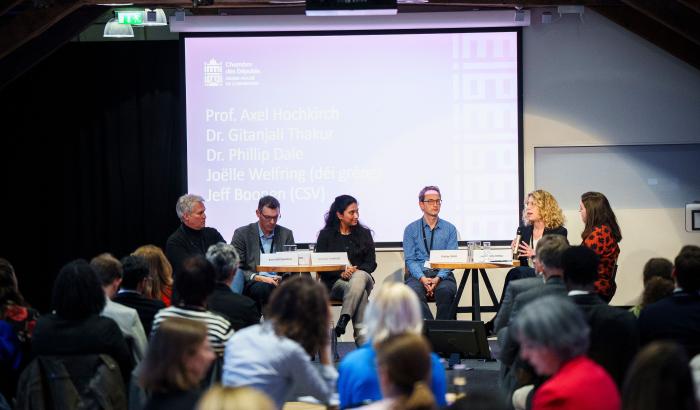
Adobe Stock
Author: Hanna Siemaszko
Editor: Jean-Paul Bertemes (FNR)
On 23rd and 24th May the Luxembourg Parliament organises a conference at Cercle Cité in Luxembourg city about challenges of the youth in Luxembourg. To have a closer look at the subject, we interviewed two experts in child poverty, Anne-Catherine Guio (LISER) and Olivier De Schutter (Université catholique de Louvain) who recently co-authored a book called ‘Escape from Poverty: Breaking the Vicious Cycles Perpetuating Disadvantage’. In order to design better policies for Luxembourg, we need to aggregate and evaluate the data we have.
Interested in the conference about the challenges of the youth, that brings together researchers, politicians and members of the civil society? Then register here: https://www.chd.lu/en/conference_youth
Infobox
Anne-Catherine Guio works as a Research Scientist at LISER (Luxembourg Institute of Socio-Economic Research) where she focuses on material deprivation, poverty, social exclusion and well-being – applied to both the overall population and the specific situation of children.
Olivier De Schutter is a legal scholar specialising in economic and social rights. He is a professor at the Université catholique de Louvain and Science Po (Paris) and serves as the United Nations Special Rapporteur on extreme poverty and human rights.
Luxembourg is a rich country. So is there any reason to worry about child poverty?
Anne Catherine Guio: Actually, in Luxembourg, one child out of four lives below the poverty line, which is defined at the EU level as 60% of the median income. It’s one of the highest in the EU. Some say the threshold should not be defined at the national level. But this is exactly what we want. We want to compare the Luxembourgish level of living inside the country, not confront it with the Romanians or the Estonians.
For sure, there is a lot of in-kind support like free childcare, free transport, free books. Thanks to that, the level of child poverty decreases a bit, but only a bit.
However, when you take into account the child-specific deprivation, - really looking at the living conditions of children : do they have access to games, to leisure, but also to food, shoes and clothes – then you discover that 8% of children live in deprivation in Luxembourg. In countries such as Croatia, Estonia, Lithuania, the deprivation rate is much lower. So, if you look at the wealth of the country as the level of GDP, you really see that Luxembourg does not meet the target that it could reach based on its wealth.
You mentioned child-specific deprivation: you contributed to the definition of this indicator?
Anne Catherine Guio: Yes. Child-specific deprivation results from the resources of the household: how much money they have and the social transfers, but also the costs. In Luxembourg, one of the main problems are the housing costs. Especially for renters, especially on the private market, especially for the lone parents. Lone parents suffer from an additional problem of being alone and having to afford everything like a couple, including housing which is huge. To sum up, to calculate the child-specific deprivation we look at access to 17 different items such as leisure, meals, clothes or keeping the house adequately warm.
When we discuss poverty, we often talk about social mobility. What is it and how does it look in Luxembourg?
Oliver De Schutter: Social mobility refers to the possibility to move from one level of income to another, for example, to move from the 10% poorest to the 30% joining the middle class. Most people assume that some levels of inequality are desirable because that would motivate people to make efforts, to seek better qualifications, and thus some level of inequality would increase the number of people changing their levels of income. But we show in our book the opposite, that, in fact, high levels of inequality discourage people from making efforts to overcome disadvantage, and high levels of inequality lead to less social mobility. In other terms, if you want to live the American Dream, you’d better live in Denmark, because in the US, where levels of inequality are quite high, it is very difficult to overcome disadvantage and to move from the lowest decile of the population to the median income. Whereas it's much easier in countries which have much less inequality, such as Denmark.
Anne-Catherine: In Luxembourg, in a recent study we asked the adults about the economic situation of their family when they were 14. This way we could see the poverty rate of these adults today in function of the economic situation when they were teenagers. Adults who lived in a difficult situation when they were teenagers have higher probability to be poor adults now. So child or teenager poverty seems to have an impact on the income level as an adult.
Anne-Catherine, together with Eric Marlier and Hugh Fraser, the co-authors of the book, you advised the European Commission in its proposals that led to the adoption of the European Child Guarantee. Can you tell us what it is?
Anne Catherine: The commitment of Member States was to guarantee to all children living in poverty or social exclusion to have free access to healthcare, childcare, free school meals and free schooling, as well as adequate access to housing and nutrition. It was signed in 2021 and now we are monitoring the progress in different EU countries. As for the Luxembourgish situation, I would say that on paper Luxembourg performs quite well because there is free childcare, at least 20 hours per week (Chèque-service Accueil). There are also policies guaranteeing that education costs are not too high for the households with children. For children living in poor families, there are also free meals in primary and secondary education. The problem is that it's not easy to find adequate data to check if people with the lowest income really have effective access to these policies.
We know from NGOs that it's difficult for poor families to use the childcare if both parents don’t work, or if at least one parent doesn’t work full time, or if there’s no free childcare in the neighbourhood. This is also true for school meals. The data is available in different ministries, but it is not used to assess and to evaluate the policies in place, which is really a big challenge that Luxembourg faces.
Olivier: Anne-Catherine is alluding to the fact that when rights are guaranteed on paper, this does not necessarily mean that every child has access to them because there is a high rate of non-take up of rights, particularly by families in poverty. I dedicated a whole report for the UN on this issue. One of the findings was that low-income households which have poor access to information, poor access to Internet services, which are not equipped to fill in online forms and provide documentation as required to benefit from certain programmes, may be left out from certain schemes that are in theory accessible to them. So there's a gap between legal coverage and effective coverage. And this gap is one that we have to be very attentive to.
The only way to do this is to ensure the adequate participation of people in poverty in the design of the schemes, so that the very concrete obstacles that they face are not overlooked by the legislator. In June 2023, there was a major meeting in Luxembourg of the International Social Security Association that spent whole two days discussing this issue of non-take-up of rights, which therefore is now gladly increasing the visibility amongst policymakers.
Anne Catherine: We have just published a study on non-take-up of rights in Luxembourg. For the housing allowance (subvention de loyer) the non-take-up is 80%. For the cost-of-living benefit (allocation de vie chère), it is 60%. Actually, in many cases people do claim these allowances, but for a variety of reasons they don’t meet the eligibility criteria: examples include lone parents having to prove that the other parent disappeared and doesn’t help them financially, allowances only for people with very low incomes or students who are excluded from applying for certain allowances.
What is the classic approach to fighting poverty in general and what are your key suggestions to the policymakers? How should we get rid of this vicious circle?
Olivier: The classic way in which we've been combating poverty in the past is very simple. You grow the economy, you increase monetary wealth, and then by tax and transfers, you redistribute the wealth created to people in poverty to compensate for the fact that the market creates inequalities. This has been at the heart of the building of the welfare state, particularly after the second World War, during the 30 years where we had very strong rates of economic growth. I think we are now reaching the limits of this system for two reasons.
First of all, economic growth cannot be pursued infinitely and we are crossing a number of planetary boundaries. Our environmental footprint is really strong, there is loss of biodiversity, greenhouse gas emissions are responsible for climate change, we overuse resources, and so on. So we must be much more attentive to ways of combating poverty without relying on economic growth.
And secondly, the limit is political. If you have an economy that is creating inequalities, and then you take from the rich to redistribute to the poor, there will be a point where people will resist taxation, will not want this Robin-Hood approach to combating poverty, and that will make it very difficult for governments to continue fighting poverty, if they meet this resistance. Very few political parties during the election time will claim they want to raise taxes to help the poor more. So that is why we need to move to a sort of second-generation type of solutions to combating poverty, which should make the economy much more inclusive, ensure that the way the market operates gives fair chances, fair opportunities to all, ensuring that the experience gained by people in poverty, even though they don't have the diplomas that formalise this, will be recognised, having strong anti-discrimination provisions to protect people in poverty from facing discrimination. In other terms, we must not only redistribute wealth, we must also ensure that the economy is inclusive and does not create inequalities in the first place. And that is, I think, also in the interest of sustainable welfare states, to avoid support to low-income households having to depend on an ever-increasing size of the economy, which is simply environmentally not sustainable.
Anne Catherine: In Luxembourg we are exactly at a turning point. So far, we have invested a lot in growth and some sectors have expanded a lot, but it has really created polarisation of the society. Now we’re facing the danger of this polarisation in terms of poverty, but also in terms of social cohesion.
Want to know more about the challenges of the youth? Then participate this Thursday and Friday in the Chambre des Députés conference in which one of our interviewees, Prof. Olivier De Schutter, will have a keynote speech. The conference is a chance to look closer at the topic of intergenerational poverty, but also education, inclusion in the world of work, health and well-being of the youth as well as public participation. The subjects will be discussed by panellists representing the world of research, politics and civil society. The conference is on 23rd and 24th May at Cercle Cité in Luxembourg city and you can register here: https://www.chd.lu/en/conference_youth





